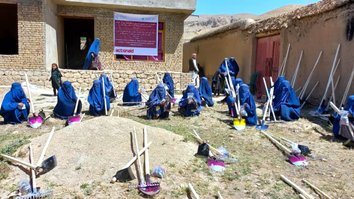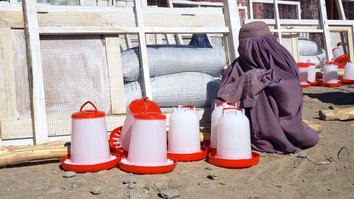KUNDUZ -- The Norwegian Afghanistan Committee (NAC) is implementing a three-month work-for-food initiative for 150 impoverished Afghan women in Badakhshan province.
With support from the World Food Programme (WFP), NAC has created employment for these women in agriculture support projects in Keshem and Shuhada districts and in the sixth district of Faizabad, Badakhshan's provincial capital.
The initiative launched on August 2, said Qutbuddin Dehnawi, director of the Badakhshan Directorate of Agriculture, Irrigation and Livestock.
"These women work in the farms of the Directorate of Agriculture, Irrigation and Livestock of Badakhshan and the provincial women's park, in return for food packages that they receive at the end of each month," he said.
The food packages contain flour, oil and chickpeas, he added.
"Qoriyas (agricultural nurseries) have already been set up in the area," he said. "These women are busy taking care of trees, plants and weeding."
Economic empowerment
Many of the women participating in the initiative are their family's sole breadwinner, and they say the programme helps cover their family's daily expenses.
Qudsia, 36, a beneficiary of the project in Faizabad, said she is happy with her work, as the food items provided by the project meet her daily needs.
"I used to work in the private sector," she said. "I was jobless for months until I finally got work in the farms in Faizabad."
"We weed the qoriyas, water the plants daily and maintain them to harvest," she said.
Working on the project is essential for her, as the food she gets at the end of each month feeds her children, she said.
Gulsum Ashrafi, another beneficiary of the project in Faizabad, said she was in a dire economic situation before joining the initiative.
"I was a schoolteacher before this," she said. "Because of unemployment in the last year, I turned to the agriculture sector."
"We are happy that there is decent work for women, and we can now have legitimate income and contribute to our country's greenery," she said.
"We have the right to work outside our homes and earn our living," Ashrafi said, adding that women should not stay at home.
After losing many male breadwinners to the war, and amid the high rate of unemployment among men, women must work to keep their families alive, local residents say.
"Women must work in these tough economic times to feed their families," said Abdul Raouf Karimi, a Badakhshan resident.
"Working women face many challenges," he said, "but they will overcome those challenges and will make a brighter future for themselves."
"The more work opportunities women have, the more they will be able to provide for their families and become financially independent," Karimi added.

![In this undated photo, employees of the Norwegian Afghanistan Committee (NAC) provide food supplies to needy women in Badakhshan province. [Courtesy of NAC]](/cnmi_st/images/2022/09/01/36904-b-585_329.jpg)







What hurt me the most after reading this report was Ms. Gulsom Ashrafi's remarks. She said she used to be a schoolteacher but is now forced to do agricultural work. She used to teach this country's children, educate them, and help them achieve their dreams, but is now forced into other work. These are bizarre phenomena in Afghan society. There is no sense of embarrassment when women panhandle, farm, weave rugs, or do other hard labor, yet there is shame associated with the presence of women in schools. They [The Taliban] feel ashamed of women working in offices and government agencies but they don't care if women work in fields or in other people's houses. Where does this double standard come from, and why are people, the Taliban particularly, so shameless and audacious? Please use your common sense and your brain a bit.
Reply4 Comment
It is good that at least some 150 women acquired jobs. This means that 150 families were removed from a dire situation. However, this situation must be stopped. Through Salaam Times, I call on the Taliban to accept the international community's reasonable conditions to be recognized. They should allow girls to learn and go to school, form a national government, avoid monopolization, and include all categories and ethnic groups in power. If they don't do this, the international community will never recognize their government, which would harm the country's ordinary people, for the international aid organizations cannot help people and keep them alive until the Day of resurrection.
Reply4 Comment
I oppose these short-term aid initiatives. Such aid should be reserved only for emergencies, such as times when people are forced to leave an area amid a war. In these recent instances [covered in this article], no natural disaster has occured, and residents have not been hurt, so they should work and earn a living for themselves. If these organisations really want to help, they could help other provinces like Nangarhar, Laghman and Logar that have been damaged by floods. In those areas, residents are forced to spend the night on the roads [as they have no other place to go,] and they have nothing to eat.
Reply4 Comment
I am against this short-term aid because any natural calamity has not hit the region. If such assistance is given, it should be given only in emergencies, such as when people leave an area due to war, it should be given to them, to the victims of natural disasters, and not to 150 women at the level of a province. This is just stupid work. The leaders of these institutions are thieves. They see their benefit in it. Otherwise, why help 150 out of millions of people, not the rest? This area has not been damaged by recent natural disasters, let alone the people who work there. And provide something for yourself. If these institutions want, they should provide aid to Nangarhar, Laghman, Logar, and other provinces that floods have damaged, and people spend nights on the road and have nothing to eat because those provinces need it even more.
Reply4 Comment